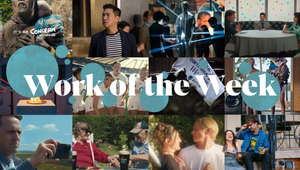
Sexual Harassment Still Rife But timeTo Starting to See Progress

The UK industry’s concerted efforts to measure and tackle sexual harassment is making an impression but there’s still work to do, according to a survey launched today.
The survey of 1,114 people found that in the past 12 months 9% of people had experienced sexual harassment – 14% of female respondent. Of those who had been harassed, 46% had been harassed more than once. And despite growing awareness of the issue, there is still reluctance to speak up, with 79% of victims never officially reporting their experiences, preferring to tell a colleague or friend.
The survey comes after over a year of effort from the Advertising Association, industry charity NABS, WACL, Credos and agency Lucky Generals. timeTo kicked off in the summer of 2018 with a survey, a set of guidelines and a programme that companies could sign up to, to commit to best practices. Lucky Generals created a publicity campaign, ‘Where Do You Draw the Line’, which also had a big presence in Cannes this year.
So what progress has been made? Thankfully, it seems that the #MeToo phenomenon and industry-wide initiatives such as timeTo have made some headway. The 2018 survey, 28% of respondents have suffered sexual harassment in the past 12 months, compared with 9% of those surveyed this year. There’s a caveat that the 2019 survey respondents have been recruited through the 232 timeTo endorser companies which may have a different culture and understanding of harassment than non-endorsing companies - so it's unclear if this finding reflects a general drop across the industry or if it's particular to timeTo endorser companies.
Awareness of the timeTo initiative is at 60%, though women are more likely to be aware of it (63% versus 56% male). Awareness of ‘Where Do You Draw the Line’ is at 43%, with less of a gender split (44% female, 42% male).
The survey also revealed a hunger for clearer guidelines about what is and what isn’t acceptable, with 46% of respondents requesting such information. 31% said they wanted new tools and training to better deal with sexual harassment.
In response, timeTo has announced a training scheme to launch in the first quarter of 2020 and helpful tools to help companies mitigate risk. For example, timeTo research from last year revealed that evening events where alcohol was present and work trips were flashpoints for harassment – so they have created a planner to keep track of all such activity. They’ve also created templates and assets for signatory companies and clearer guidance on what actions people can take in specific circumstances – for example what someone witnessing sexual harassment can do during and after the fact.















